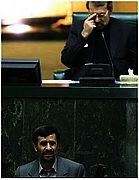Is It Time to Remove Larijani?
» Administration Supporters Strive to Take Leadership of Majlis
While less than 20 days are left for the eight Majlis leadership elections, Mahmoud Ahmadinejad’s allies in the legislature are continuing their efforts to prevent current Majlis Speaker Ali Larijani from retaining his legislative leadership seat. Some Majlis deputies have put forth certain conditions for Majlis leadership as a way to prevent Larijani from becoming the candidate for the assembly’s highest position while at the same time presenting their own candidates. So far two names have been suggested: former Majlis speaker Gholam-ali Haddad Adel (who is currently the head of the cultural committee) and Morteza Agha-Tehrani.
Since Haddad has publicly said that he has no “plans to be part of the leadership of the Majlis,” this has created problems for Ahmadinejad’s allies in the assembly and as a result some of them in the Islamic Republic faction (supporters of the administration in the Principalist camp who are also knows as the idealogues) are now focusing on their choice, Morteza Agha-Tehrani. These pro-administration allies stress that Ali Larijani cannot hold two positions simultaneously, i.e. he should not be the head of the Majlis while at the same time being the head of the Principalist faction in the Majlis. He needs to choose one, they have argued.
Tehrani, who is a representative from Tehran and is also known as the ethics teacher of Ahmadinejad’s administration, has said that if Majlis deputies come to believe that the current leadership is close to their goals, they would decide to keep them. Otherwise, current leaders would not get the vote. If a change is made, then this would be a meaningful event.”
This favorite of the administration also made another point and pointing to Larijani’s dual position of leadership of the Majlis while also being the leader of the Principalists and said, “I have sincerely told him that he should not accept to be the leader of the Principalists while he is the leader of the Majlis because this results in that the interests of the Majlis find their way in the faction while the interests of the faction find their way in the Majlis, and this results in a conflict of interest.”
Tehrani also mentioned one of the complaints of pro-Administration Majlis deputies over the current Speaker and said, “Because of the current situation, I do not believe that the faction has been active at all and did not produce a single statement after the post election problems. Specific individuals may have taken positions on the issue, but I believe that we in fact are not Principalists and the reason for this may be what I just mentioned.”
But this is not the only complaint that pro-Administration representatives have, because even while Larijani did hold both positions, he also announced plenty of criticism of the policies of Ahmadinejad’s administration and refrained from appearing at any joint meeting of the Principalists in the Majlis and Ahmadinejad.
Larijani has not only blocked many bills that the government expected to pass into law without any questioning, he had opposed the support that the Principalist faction in the Majlis was providing to Ahmadinejad’s presidential aspirations.
The current speaker knows well that pro-Administration representatives in the Principalist faction do not support him and even mentioned it in public just a few days ago when he met with members of the Motalefe Islami faction (Islamic Coalition faction) in the Majlis, when he said, “There is no question that Principalists must remain committed, be religious, and accept the Islamic republic and the Velayat Faghih theory (rule of clerics), but they can at the same time have differences among themselves in other cultural, economic and diplomatic policies.”


